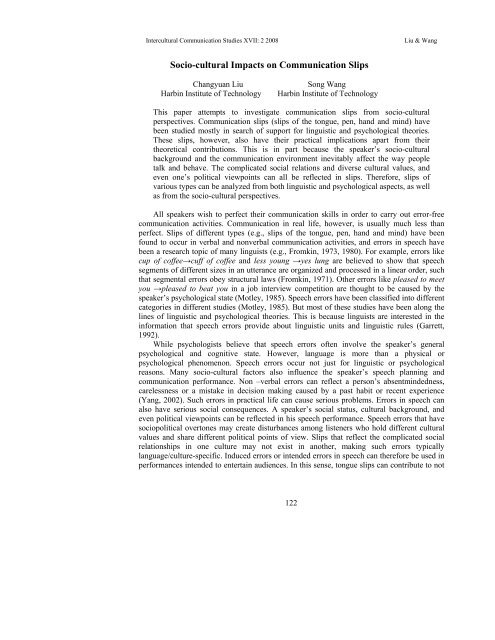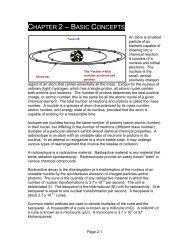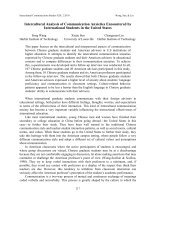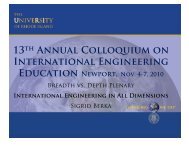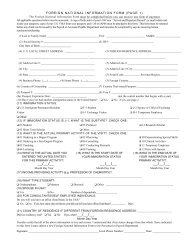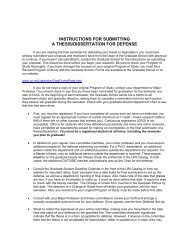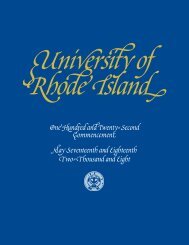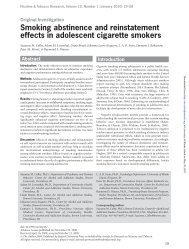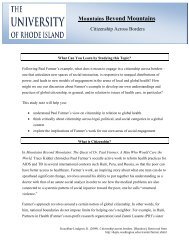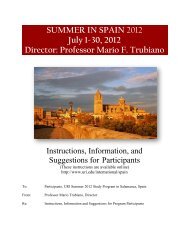Socio-cultural Impacts on Communication Slips
Socio-cultural Impacts on Communication Slips
Socio-cultural Impacts on Communication Slips
Create successful ePaper yourself
Turn your PDF publications into a flip-book with our unique Google optimized e-Paper software.
Inter<str<strong>on</strong>g>cultural</str<strong>on</strong>g> Communicati<strong>on</strong> Studies XVII: 2 2008 Liu & Wang<br />
<str<strong>on</strong>g>Socio</str<strong>on</strong>g>-<str<strong>on</strong>g>cultural</str<strong>on</strong>g> <str<strong>on</strong>g>Impacts</str<strong>on</strong>g> <strong>on</strong> Communicati<strong>on</strong> <strong>Slips</strong><br />
Changyuan Liu S<strong>on</strong>g Wang<br />
Harbin Institute of Technology Harbin Institute of Technology<br />
This paper attempts to investigate communicati<strong>on</strong> slips from socio-<str<strong>on</strong>g>cultural</str<strong>on</strong>g><br />
perspectives. Communicati<strong>on</strong> slips (slips of the t<strong>on</strong>gue, pen, hand and mind) have<br />
been studied mostly in search of support for linguistic and psychological theories.<br />
These slips, however, also have their practical implicati<strong>on</strong>s apart from their<br />
theoretical c<strong>on</strong>tributi<strong>on</strong>s. This is in part because the speaker’s socio-<str<strong>on</strong>g>cultural</str<strong>on</strong>g><br />
background and the communicati<strong>on</strong> envir<strong>on</strong>ment inevitably affect the way people<br />
talk and behave. The complicated social relati<strong>on</strong>s and diverse <str<strong>on</strong>g>cultural</str<strong>on</strong>g> values, and<br />
even <strong>on</strong>e’s political viewpoints can all be reflected in slips. Therefore, slips of<br />
various types can be analyzed from both linguistic and psychological aspects, as well<br />
as from the socio-<str<strong>on</strong>g>cultural</str<strong>on</strong>g> perspectives.<br />
All speakers wish to perfect their communicati<strong>on</strong> skills in order to carry out error-free<br />
communicati<strong>on</strong> activities. Communicati<strong>on</strong> in real life, however, is usually much less than<br />
perfect. <strong>Slips</strong> of different types (e.g., slips of the t<strong>on</strong>gue, pen, hand and mind) have been<br />
found to occur in verbal and n<strong>on</strong>verbal communicati<strong>on</strong> activities, and errors in speech have<br />
been a research topic of many linguists (e.g., Fromkin, 1973, 1980). For example, errors like<br />
cup of coffee→cuff of coffee and less young →yes lung are believed to show that speech<br />
segments of different sizes in an utterance are organized and processed in a linear order, such<br />
that segmental errors obey structural laws (Fromkin, 1971). Other errors like pleased to meet<br />
you →pleased to beat you in a job interview competiti<strong>on</strong> are thought to be caused by the<br />
speaker’s psychological state (Motley, 1985). Speech errors have been classified into different<br />
categories in different studies (Motley, 1985). But most of these studies have been al<strong>on</strong>g the<br />
lines of linguistic and psychological theories. This is because linguists are interested in the<br />
informati<strong>on</strong> that speech errors provide about linguistic units and linguistic rules (Garrett,<br />
1992).<br />
While psychologists believe that speech errors often involve the speaker’s general<br />
psychological and cognitive state. However, language is more than a physical or<br />
psychological phenomen<strong>on</strong>. Speech errors occur not just for linguistic or psychological<br />
reas<strong>on</strong>s. Many socio-<str<strong>on</strong>g>cultural</str<strong>on</strong>g> factors also influence the speaker’s speech planning and<br />
communicati<strong>on</strong> performance. N<strong>on</strong> –verbal errors can reflect a pers<strong>on</strong>’s absentmindedness,<br />
carelessness or a mistake in decisi<strong>on</strong> making caused by a past habit or recent experience<br />
(Yang, 2002). Such errors in practical life can cause serious problems. Errors in speech can<br />
also have serious social c<strong>on</strong>sequences. A speaker’s social status, <str<strong>on</strong>g>cultural</str<strong>on</strong>g> background, and<br />
even political viewpoints can be reflected in his speech performance. Speech errors that have<br />
sociopolitical overt<strong>on</strong>es may create disturbances am<strong>on</strong>g listeners who hold different <str<strong>on</strong>g>cultural</str<strong>on</strong>g><br />
values and share different political points of view. <strong>Slips</strong> that reflect the complicated social<br />
relati<strong>on</strong>ships in <strong>on</strong>e culture may not exist in another, making such errors typically<br />
language/culture-specific. Induced errors or intended errors in speech can therefore be used in<br />
performances intended to entertain audiences. In this sense, t<strong>on</strong>gue slips can c<strong>on</strong>tribute to not<br />
122
Inter<str<strong>on</strong>g>cultural</str<strong>on</strong>g> Communicati<strong>on</strong> Studies XVII: 2 2008 Liu & Wang<br />
<strong>on</strong>ly linguistic studies, but to our understanding of their social and <str<strong>on</strong>g>cultural</str<strong>on</strong>g> implicati<strong>on</strong>s as<br />
well.<br />
Studying the socio-<str<strong>on</strong>g>cultural</str<strong>on</strong>g> communicati<strong>on</strong> errors in a given language provides insight<br />
into the relati<strong>on</strong>ship between a speech error and the speaker’s social, <str<strong>on</strong>g>cultural</str<strong>on</strong>g> or political<br />
envir<strong>on</strong>ment. After illustrating what slips lead to in our everyday lives, this paper compares<br />
speech errors in Chinese and English to show how language and <str<strong>on</strong>g>cultural</str<strong>on</strong>g> differences<br />
determine the types of errors that do (or do not) occur, and how induced/intended errors work<br />
to create artistic effect in <str<strong>on</strong>g>cultural</str<strong>on</strong>g> performances.<br />
<strong>Slips</strong> of the Mind and T<strong>on</strong>gue in Practical Life<br />
The study of communicati<strong>on</strong> slips has lent support to our understanding of linguistic<br />
theories, but it also has practical implicati<strong>on</strong>s. People make slips in speech and other cognitive<br />
and physical activities. Such inadvertent errors have been related as causal factors in various<br />
accidents with serious c<strong>on</strong>sequences. For example, Reas<strong>on</strong> (1982) analyzed several<br />
catastrophic accidents in which fatalities were apparently caused by slips of the mind. A<br />
L<strong>on</strong>d<strong>on</strong> bus driver crashed a double-decker bus into a low overpass, killing six passengers,<br />
simply because he was in the habit of driving the same route in a single-decker bus. A senior<br />
pilot <strong>on</strong> the island of Tenerife failed to obtain clearance from the c<strong>on</strong>trol tower before taking<br />
off and his Boeing 747 collided with a landing plane, killing 577 passengers and crew. The<br />
reas<strong>on</strong> for this accident is believed to be that the pilot had just finished a different assignment<br />
involving hundreds of hours of training pilots in a cockpit simulator, in which runway<br />
clearance was not required. These fatal errors reflect how a highly habitual and automatic<br />
acti<strong>on</strong> can substitute for the correct <strong>on</strong>e.<br />
Like inadvertent errors of the n<strong>on</strong>-verbal kind, speech errors can also have social<br />
c<strong>on</strong>sequences. On August 31, 1995, ABC aired its regular TV program, America’s Funniest<br />
Home Videos. One of the video segments showed a graduati<strong>on</strong> cerem<strong>on</strong>y where the speaker,<br />
a professor at the school stunned the audience by c<strong>on</strong>gratulating the students <strong>on</strong> the<br />
achievement of their “tremendous amount of scholarship and tremendous amount of sex →<br />
success.” A slip like this may be accepted with understanding laughter from the audience (the<br />
speaker in fact w<strong>on</strong> a prize by sending the videotaped t<strong>on</strong>gue slip to the TV company), but<br />
other slips may face severe criticism.<br />
<strong>Slips</strong> of the t<strong>on</strong>gue or pen in Chinese have also been found to attract unwanted attenti<strong>on</strong>.<br />
During the Cultural Revoluti<strong>on</strong> in China (1966-1976), a Chinese calligrapher was allegedly<br />
punished for his “counter-revoluti<strong>on</strong>ary” behavior, simply because he slipped while brushpainting<br />
a very popular political slogan wishing Chairman Mao a l<strong>on</strong>g life. He accidentally<br />
replaced wan shou wu jiang (万寿无疆, a l<strong>on</strong>g life without limit) with the “counterrevoluti<strong>on</strong>ary”<br />
wu shou wu jiang (无寿无疆, no life without limit). In March 2000, a top<br />
Chinese legislator made a slip in his much noticed <strong>on</strong>-line work report. Turning the intended<br />
min fa dian (民法典 a civil code), into the err<strong>on</strong>eous min dian fa (民典法, a n<strong>on</strong>-existent<br />
word). The media quickly resp<strong>on</strong>ded by questi<strong>on</strong>ing the speaker’s working attitude and health,<br />
and by extensi<strong>on</strong>, his academic and administrative abilities as a senior legislator.<br />
Both verbal and n<strong>on</strong>-verbal communicati<strong>on</strong> acts can be influenced by the anticipati<strong>on</strong> and<br />
preservati<strong>on</strong> of related experiences or linguistic items. N<strong>on</strong>-verbal behaviors are governed by<br />
123
Inter<str<strong>on</strong>g>cultural</str<strong>on</strong>g> Communicati<strong>on</strong> Studies XVII: 2 2008 Liu & Wang<br />
the same mental c<strong>on</strong>trolling system that processes speech behavior. Any malfuncti<strong>on</strong>ing of<br />
this processing mechanism can lead to either slips of the mind (as in an accident) or slips of<br />
the t<strong>on</strong>gue/pen. From today’s psycholinguistic point of view, these errors can be explained<br />
without involving any political reas<strong>on</strong>ing. For example, when the Chinese calligrapher was<br />
writing the character wan (万), he was already anticipating the future character wu (无),<br />
resulting in the error. The verbal slip of the Chinese legislator is also caused this way. The<br />
c<strong>on</strong>text of his speech prior to the slip point c<strong>on</strong>tains a number of lexical items involving the<br />
word suffix fa (法, law), such as g<strong>on</strong>gsi fa (公司法, corporati<strong>on</strong> law), baoxian fa (保险法,<br />
insurance law), shangbiao fa (商标法, trademark law), zhuanli fa (专利法, patent law),<br />
hunyin fa (婚姻法, marriage law). Experiments in other languages (e.g., Japanese) have<br />
shown that such a frequency effect does indeed increase the chance of making errors of the<br />
slip-of-the-pen kind (Nihei, 1988; see also Kess & Miyamoto, 1994 for references).<br />
Nevertheless, speech errors by different speakers may reveal the storage of a speaker’s<br />
working lexic<strong>on</strong>. A slip like that made by the legislator is much less likely to occur in the<br />
speech of some<strong>on</strong>e who never deals with law terms. This reminds us of the fact that some<br />
very comm<strong>on</strong> error types found in Chinese may never occur in English and vice versa.<br />
<strong>Slips</strong> and Language/Culture Differences<br />
Errors in English and Chinese may be classified into similar categories. Languagespecific<br />
and culture-specific characteristics, however, determine the differences between the<br />
two languages in terms of the likelihood of certain types of errors occurring rather than others.<br />
For example, word orders in Chinese topic-comment structures may follow more patterns than<br />
the largely SVO word order in English. Errors that involve c<strong>on</strong>s<strong>on</strong>ant cluster and derivati<strong>on</strong>al<br />
segments are comm<strong>on</strong> in English, but are not in a language like Mandarin Chinese which<br />
allows no c<strong>on</strong>s<strong>on</strong>ant cluster within a syllable. On the other hand, errors related to t<strong>on</strong>es and<br />
logo-ph<strong>on</strong>ological features are typical am<strong>on</strong>g Chinese speakers, but are obviously not as<br />
likely in English. Structural differences may show that errors are more likely to be found in<br />
certain areas. For example, while it is unlikely or impossible that a Chinese speaker can make<br />
errors with structural elements such as the pers<strong>on</strong>al pr<strong>on</strong>ouns (e.g., he for she or it, me for I ),<br />
it is quite possible for an English speaker to make such errors. The following are a few<br />
examples from Fromkin (1973):<br />
1. Laurie’s boyfriend has l<strong>on</strong>ger hair →…than he does<br />
than she does.<br />
2. I told him (Peter) you were not coming. → I told her you were not<br />
coming in today.<br />
3. The city has a pers<strong>on</strong>ality of its own. → …of his own<br />
4. I gave it to him. →….to he<br />
It is obvious that the underlined items in the above sentences are pr<strong>on</strong>ouns in different<br />
cause and gender, and they interfere with each other in the course of lexical retrieval.<br />
However, such errors are not likely to occur in Chinese, since all the third–pers<strong>on</strong> singular<br />
pr<strong>on</strong>ouns in any gender and case are associated with <strong>on</strong>e and the same m<strong>on</strong>osyllabic<br />
124
Inter<str<strong>on</strong>g>cultural</str<strong>on</strong>g> Communicati<strong>on</strong> Studies XVII: 2 2008 Liu & Wang<br />
representati<strong>on</strong> ta. Disregarding its written format, the pr<strong>on</strong>oun ta in Chinese in most cases can<br />
be the English equivalent of he, she, him, her, or it, depending <strong>on</strong> the speech c<strong>on</strong>text.<br />
Although there are different lexical representati<strong>on</strong>s for a third–pers<strong>on</strong> singular pr<strong>on</strong>oun in<br />
Chinese depending <strong>on</strong> gender and case differences (e.g., male/female and subject /object ), the<br />
ph<strong>on</strong>ological representati<strong>on</strong> of these items is the same. A Chinese speaker can select a<br />
reference in the lexic<strong>on</strong> without making an error so l<strong>on</strong>g as the lexical item is third pers<strong>on</strong><br />
singular. This suggests that an English speaker has to process at least five times as many<br />
items as a Chinese speaker in choosing the right pr<strong>on</strong>oun from the same category. It is evident<br />
that such factors within the structural build-up of a language can determine the likelihood of<br />
error occurrence in that language.<br />
Similar differences between languages in the probability of making errors can also be<br />
determined by socio-<str<strong>on</strong>g>cultural</str<strong>on</strong>g> factors related to the language items involved. English speakers<br />
may make errors that are not likely to occur in Chinese, but they are very unlikely to make<br />
errors of the following kind (errors which are typical for Chinese) which involve the<br />
complicated system of Chinese kinship terms:<br />
5. ta quan kao ta de g<strong>on</strong>gg<strong>on</strong>g → ta de yuefu<br />
她全靠她的公公。 她 的岳父<br />
“She totally depends <strong>on</strong> her “…(his) father–in–law”<br />
father-in-law.”<br />
6. ni gege bi ni da ji sui ? → ni didi bi ni da ji sui ?<br />
你哥哥比你大几岁? 你弟弟比你大几岁?<br />
“How much older than you is “How much older than you<br />
your (older) brother ?” is your (younger) brother ?”<br />
7. ta de saozi hen piaoliang → xiaogu hen piaoliang<br />
她的嫂子很漂亮。 小姑很漂亮。<br />
“Her sister –in –law is pretty.”<br />
8. kuai jiao shushu → dada<br />
快叫叔叔 大大<br />
“Quick, say hello to your uncle.”<br />
The above examples illustrate some c<strong>on</strong>fusi<strong>on</strong> in the use of kinship terms in Chinese,<br />
which is sufficiently complicated that speakers sometimes retrieve the wr<strong>on</strong>g item from a web<br />
of kinship terms. Although both the terms g<strong>on</strong>gg<strong>on</strong>g 公公 and yuefu 岳父 in 5 are equivalent<br />
to the English term “father-in-law”, they in fact give different c<strong>on</strong>notati<strong>on</strong>s in the Chinese<br />
kinship term system. G<strong>on</strong>gg<strong>on</strong>g refers to the father of the husband, while yuefu refers to the<br />
father of the wife. A married woman can call her father-in-law g<strong>on</strong>gg<strong>on</strong>g, but not yuefu, while<br />
a married man can call his father-in-law yuefu but not g<strong>on</strong>gg<strong>on</strong>g. The speaker in example 5<br />
violated this pragmatic rule in her speech, hence the error.<br />
The misused terms in example 6 are gege 哥哥 “elder brother” and didi 弟弟 “younger<br />
brother,” both of which are the equivalent of the English term “brother.” In English, <strong>on</strong>e’s<br />
“brother” can be either younger or older than the referent, but a Chinese speaker uses different<br />
terms accordingly. In Chinese, the relati<strong>on</strong>ship between saozi 嫂子 and xiaogu 小姑 in<br />
example 7 is that of a “sister-in-law.” Saozi refers to the wife of <strong>on</strong>e’s elder brother while<br />
125
Inter<str<strong>on</strong>g>cultural</str<strong>on</strong>g> Communicati<strong>on</strong> Studies XVII: 2 2008 Liu & Wang<br />
xiaogu refers to a younger sister of <strong>on</strong>e’s husband. These two terms are represented by <strong>on</strong>e<br />
and the same term ‘sister-in-law’ in English. The word dada 大大 in example 8 refers to an<br />
elder brother of <strong>on</strong>e’s father, and shushu 叔叔 <strong>on</strong>e’s father’s younger brother. Since “uncle” is<br />
the term to cover both, English speakers do not run into troubles leading to errors of this kind.<br />
Speech errors like these arise from socio-<str<strong>on</strong>g>cultural</str<strong>on</strong>g> characteristics that influence speech<br />
producti<strong>on</strong>. From a sociolinguistic point of view, the basic unit of a community in every<br />
society is the family. Kinship terms are a major part of address terms. In English, kinship<br />
terms are relatively simple. For example, five English terms (brother, sister, cousin, brotherin-law<br />
and sister-in-law) can cover all <strong>on</strong>e’s family members and relatives of the same<br />
generati<strong>on</strong>. In Chinese, however, a speaker must make clear how he or she is related to the<br />
addressee.<br />
The English term “cousin” covers a large range of kinship relati<strong>on</strong>s. In Chinese, cousins<br />
are not <strong>on</strong>ly distinguished with respect to gender and age differences (e.g. biaoge 表哥 “an<br />
older male cousin,” biaomei 表妹 “a younger female cousin”), but also distinguished by the<br />
“closeness” of the relati<strong>on</strong>ship. Traditi<strong>on</strong>al Chinese families are centered round the father (e.<br />
g., children carry the name of the father). Cousins <strong>on</strong> the father’s side are c<strong>on</strong>sidered closer to<br />
the family than those <strong>on</strong> the mother’s side. Such differences are clearly marked in forms of<br />
address. For example, the English term cousin can have different equivalents in Chinese. The<br />
morphological prefixes tang 堂 “in-house” and biao 表 “superficial” in kinship terms indicate<br />
whether a cousin has a closer relati<strong>on</strong> to the family (a child of the father’s brother but not<br />
sister ), or has a distant relati<strong>on</strong>ship (a child of the father’s sister or a child of the mother’s<br />
brother/sister). Such differences in kinship terms leave more choices for a Chinese speaker<br />
than for an English speaker, hence, more chances for errors involving such address terms.<br />
This is because a speaker has to select the most appropriate term from a list of related kinship<br />
terms. The speaker of example 9 below has to make clear the relati<strong>on</strong>ship between the two<br />
referents in his speech and therefore has to correct any error in speech that might c<strong>on</strong>fuse the<br />
listener.<br />
9. tamen shi biao — tang xi<strong>on</strong>gdi<br />
他们是表—堂兄弟。<br />
“They are maternal —paternal cousins.”<br />
The speaker in 9 has to stop short after uttering biao, realizing that the relati<strong>on</strong>ship<br />
between the cousins is paternally related (which is closer than biao), and hence changed to<br />
tang. This complex kinship system reflects the strict C<strong>on</strong>fucianist principle of group<br />
membership, making a clear demarcati<strong>on</strong> between insiders and outsiders even within an<br />
extended family. The tang/biao differentiati<strong>on</strong> also applies to relatives of different<br />
generati<strong>on</strong>s, making the already complicated kinship system even more complex. This system<br />
greatly increases the number of competitive choices for an error to occur than in English.<br />
Another influential factor that makes it less likely for English speakers to make errors of<br />
this type is that English speakers tend to address relatives or acquaintances by name. When<br />
the relati<strong>on</strong>ship between the speaker and a referent becomes too complicated, the name of the<br />
referent is used in place of a particular kinship term or a title. It is not uncomm<strong>on</strong> to hear an<br />
English speaker call his or her seniors, or even parents, by name. This addressing pattern<br />
126
Inter<str<strong>on</strong>g>cultural</str<strong>on</strong>g> Communicati<strong>on</strong> Studies XVII: 2 2008 Liu & Wang<br />
saves a lexical search for the appropriate term, reducing the chance of making an error in the<br />
course of retrieving and producing the right lexical item. In Chinese, however, it is c<strong>on</strong>sidered<br />
inappropriate or impolite to address <strong>on</strong>e’s senior by name. In c<strong>on</strong>venti<strong>on</strong>al practice,<br />
interlocutors must be addressed with a kinship term (e.g. erge 二哥 “sec<strong>on</strong>d elder brother,”<br />
san yi 三姨 “third aunt <strong>on</strong> the mother’s side”), a title (e.g. changzhang 厂长 “factory chief,”<br />
zhuren 主任 “director”),or surname plus a title (e.g. Zhang yisheng 张医生 “Doctor Zhang,”<br />
Li jiaolian 李教练 “Coach Li”). A speaker has to c<strong>on</strong>sider social appropriateness during<br />
speech producti<strong>on</strong> and make adjustment according to the relati<strong>on</strong>ship between the speaker and<br />
the addressee. The following examples illustrate such adjustment in speech producti<strong>on</strong>.<br />
10. Ma daifu — Ma zhuren<br />
马大夫 — 马主任<br />
“Doctor Ma — Director Ma”<br />
In example 10, the word daifu 大夫 “doctor” is a term used to show the professi<strong>on</strong> of the<br />
addressee, but not an administrative rank as the word zhuren 主任 “director” does. In a<br />
society where ranking is important in showing a pers<strong>on</strong>’s social positi<strong>on</strong>, it is often<br />
c<strong>on</strong>sidered more appropriate to address some<strong>on</strong>e by rank rather than by professi<strong>on</strong>. The<br />
speaker obviously has in mind this c<strong>on</strong>cept of class distincti<strong>on</strong>, hence the correcti<strong>on</strong> in his<br />
speech.<br />
The speech errors discussed above suggest that the socio-<str<strong>on</strong>g>cultural</str<strong>on</strong>g> characteristics of a<br />
language indeed influence speech producti<strong>on</strong> in a specific language envir<strong>on</strong>ment. They also<br />
show that different speakers have different working lexic<strong>on</strong>s and different plans before the<br />
articulati<strong>on</strong> of a sentence, and may switch from <strong>on</strong>e to another which is socio-<str<strong>on</strong>g>cultural</str<strong>on</strong>g>ly more<br />
appropriate during the sentence producti<strong>on</strong>. In such cases, speakers are not correcting<br />
themselves in terms of the lexical items they choose, but the socio-<str<strong>on</strong>g>cultural</str<strong>on</strong>g> properties of these<br />
items. Therefore, English and Chinese differ not <strong>on</strong>ly in terms of the linguistic aspects of each<br />
language; the socio-<str<strong>on</strong>g>cultural</str<strong>on</strong>g> aspects of language also play an important role in determining the<br />
likelihood of error occurrence in different domains.<br />
Speech Errors as a Source of Humor<br />
Because of the dramatic difference between what is intended and what is actually<br />
produced, slips can sometimes be humorous. In a slip, the target can be transformed<br />
ph<strong>on</strong>ologically, syntactically, or semantically, and the result can often be an unexpected<br />
utterance that is dramatically changed into something that is entirely out of the c<strong>on</strong>text. Such<br />
err<strong>on</strong>eous utterances can often produce laughter. Some well-known spo<strong>on</strong>erisms below<br />
(Fromkin, 1980) have been used to show how humorous t<strong>on</strong>gue slips could be.<br />
11. Our dear old Queen → Our queer old Dean<br />
12. You have wasted two terms. → You have tasted two worms.<br />
Intended slips are designed to bring about special effects. But such “designs” mostly<br />
imitate primed errors in real speech. Baars (1992) has observed that c<strong>on</strong>scious priming<br />
127
Inter<str<strong>on</strong>g>cultural</str<strong>on</strong>g> Communicati<strong>on</strong> Studies XVII: 2 2008 Liu & Wang<br />
increases the frequency of experimentally evoked slips in speech. For example, if <strong>on</strong>e asks<br />
some<strong>on</strong>e to repeat the word poke about half a dozen times and then asks, “What do you call<br />
the white of an egg?” most people will answer “Yolk.” Although they know the difference<br />
between egg white and yolk they have been primed by the word poke to retrieve a similarsounding<br />
item from the lexic<strong>on</strong>. Reas<strong>on</strong> (1992) has described similar instances of word games<br />
such as the following:<br />
13. Q: What do we call the tree that grows from acorns?<br />
A: Oak.<br />
Q: What do we call a funny story?<br />
A: Joke.<br />
Q: What sound does a frog make?<br />
A: Croak.<br />
Q: What is Pepsi’s major competitor?<br />
A: Coke.<br />
Q: What is another word for cape?<br />
A: Cloak.<br />
Q: What do you call the white of an egg?<br />
A: Yolk.<br />
The frequency of primes, as well as the presence of comm<strong>on</strong> ph<strong>on</strong>ological elements,<br />
clearly plays an important part in determining the likelihood of the “yolk” resp<strong>on</strong>se.<br />
Intenti<strong>on</strong>al speech errors have l<strong>on</strong>g been used in Chinese literary works. One can find<br />
numerous examples of the intended use of puns, spo<strong>on</strong>erisms, and omissi<strong>on</strong> or additi<strong>on</strong> of<br />
words, syllables or ph<strong>on</strong>emes in order to change the semantics of an utterance for entertaining<br />
or artistic effect. For example, a modest elderly Chinese movie actor was recently telling his<br />
audience over CCTV that his wife <strong>on</strong>ce wrote him a letter to c<strong>on</strong>gratulate him <strong>on</strong> becoming a<br />
ying tan xin xiu 影坛新锈, which is supposed to mean “new star in the movie industry.” But<br />
the intended “slip of the pen” <strong>on</strong> the character xiu 锈 has a metal radical , which sarcastically<br />
changed the meaning into “new rust in the movie industry.”<br />
Chinese xiangsheng 相声 “cross-talk” is a traditi<strong>on</strong>al performance that takes the form of<br />
a dialogue between two performers. Intenti<strong>on</strong>al speech errors are comm<strong>on</strong>ly found in such<br />
performances to elicit laughter from the audience. One of the methods comm<strong>on</strong>ly used by<br />
these performers is for Speaker A to set a “trap” for Speaker B by priming B with a string of<br />
ph<strong>on</strong>ologically or semantically similar words or phrases. Speaker B accepts the pattern, which<br />
is then suddenly turned to a different directi<strong>on</strong>. In this “misleading” dialogue, Speaker B<br />
appears to be following the pattern, but is unable to cope with the unexpected irregularity,<br />
resulting in the “slip” to achieve the humorous effect, just as what some psycholinguists have<br />
d<strong>on</strong>e to elicit speech errors in lab experiments. To achieve such humorous effect, the speaker<br />
must understand how the intended error is naturally embedded into the normal speech<br />
utterance and the regularities listeners listen for in comprehending it, so that the speaker can<br />
manipulate the listener. The following intenti<strong>on</strong>al errors from Shao (1993) show how<br />
intended errors are for such purposes.<br />
128
Inter<str<strong>on</strong>g>cultural</str<strong>on</strong>g> Communicati<strong>on</strong> Studies XVII: 2 2008 Liu & Wang<br />
14. A: ni dou xihuan shenme xiangmu? “What (sports) event do<br />
你都喜欢什么项目? you like?”<br />
B: juzh<strong>on</strong>g, shejian tiaosan, tiaogao, “weight-lifting, archery,<br />
tiaoyuan, tiaohe… parachute-jumping,<br />
举重,射箭,跳伞,跳高 high-jumping, l<strong>on</strong>g-jumping<br />
跳远,跳河 river-jumping…..”<br />
15. A: zhemeshuo ni ye shi guo chuan? “So, you have rowed a boat?”<br />
这么说你也驶过船?<br />
B: shi guo 驶过。 “Yes”<br />
A: ni ye yao guo lu? “You have also steered a sweep?”<br />
你也摇过橹?<br />
B: yao guo 摇过。 . “Yes”<br />
A: ni ye chu guo hai? “You have also steered in the sea?”<br />
你也出过海?<br />
B: chu guo 出过.。 “Yes”<br />
A: ni ye fan guo chuan? “You have also overturned a boat?”<br />
你也翻过船?<br />
B: fan guo — mei fan guo! “Yes — No, never!”<br />
翻过—没翻过!<br />
In 14, Speaker B is “trapping” the audience with a list of sports events that are also<br />
ph<strong>on</strong>ologically similar, priming the listener with the X-jumping’s pattern. However, Speaker<br />
B ends up making a “slip” that is semantically opposite to the c<strong>on</strong>cept of sports (since tiaohe<br />
跳河 “river jumping” in Chinese normally refers to committing suicide by drowning ). In 15,<br />
Speaker A first asked a number of questi<strong>on</strong>s that B could most possibly answer with a “yes.”<br />
To explain this in a structural way, A primed B with the interrogative sentence structure of ni<br />
X guo Y (?) “Have you ever X-ed a Y?” (where X is a verb with the perfective aspect marker<br />
guo 过, and Y is a noun representing an object affected by the acti<strong>on</strong> of the verb X). When<br />
Speaker B “falls” into the pattern by simply answering X-guo’ (Yes, I have X-ed a Y)’ to all<br />
of Speaker A’s questi<strong>on</strong>s, Speaker A asked an off-the-pattern questi<strong>on</strong> that is most likely to be<br />
answered with a “no” (since not every<strong>on</strong>e has the experience of fan guo chuan “to have<br />
overturned a boat” as the Chinese culture c<strong>on</strong>siders it a very bad luck). Such an unexpected<br />
pattern change caused Speaker B to say “yes” instead of “no” in the answer, as he has been<br />
deeply primed by the previous pattern.<br />
Intended speech errors are designed and produced to amuse the audience. Although they<br />
are not real errors in the sense that they are produced as intended, a careful study of these<br />
errors shows that errors may be primed ph<strong>on</strong>ologically, semantically and structurally. Speech<br />
errors in an entertaining performance are very similar to experimentally elicited errors in that<br />
they all involve a carefully set speech envir<strong>on</strong>ment in which the speaker is c<strong>on</strong>diti<strong>on</strong>ed in<br />
different ways. It is evident that designed errors can trigger laughter and bring entertaining<br />
effect, following the same processing patterns as normal errors do. But speakers of intended<br />
errors must also follow linguistic rules to achieve the desired effect of their intenti<strong>on</strong>al slips.<br />
Therefore, a good understanding of the language internal rules and their social and <str<strong>on</strong>g>cultural</str<strong>on</strong>g><br />
129
Inter<str<strong>on</strong>g>cultural</str<strong>on</strong>g> Communicati<strong>on</strong> Studies XVII: 2 2008 Liu & Wang<br />
implicati<strong>on</strong>s, as well as language processing mechanisms in general, is essential for creating<br />
ideal speech effects.<br />
C<strong>on</strong>clusi<strong>on</strong><br />
<strong>Slips</strong> in verbal communicati<strong>on</strong> have been mainly discussed within the frame of reference<br />
provided by linguistic and psychological theories. But the analysis of the socio-<str<strong>on</strong>g>cultural</str<strong>on</strong>g><br />
aspects of such slips and their practical implicati<strong>on</strong>s have been rarely addressed in the<br />
literature. Speech errors occur in the course of verbal communicati<strong>on</strong>, and such<br />
communicati<strong>on</strong> is inevitably c<strong>on</strong>ducted within a given socio-<str<strong>on</strong>g>cultural</str<strong>on</strong>g> envir<strong>on</strong>ment. Studying<br />
the socio-<str<strong>on</strong>g>cultural</str<strong>on</strong>g> factors that cause speech errors in a given language provides insight into the<br />
relati<strong>on</strong>ship between a speaker and his or her working lexic<strong>on</strong> determined by his/her socio<str<strong>on</strong>g>cultural</str<strong>on</strong>g><br />
background. If research <strong>on</strong> slips is limited <strong>on</strong>ly to purely linguistic and psychological<br />
activities without c<strong>on</strong>sidering the socio-<str<strong>on</strong>g>cultural</str<strong>on</strong>g> c<strong>on</strong>text of a given language, many types of<br />
errors that naturally occur in normal speech cannot be accounted for. The socio-<str<strong>on</strong>g>cultural</str<strong>on</strong>g><br />
envir<strong>on</strong>ments of different languages can determine how a speaker’s lexical storage is<br />
structured and the probabilities of error occurrence in normal speech. Errors of certain types<br />
are obviously very comm<strong>on</strong> in <strong>on</strong>e language, but are absolutely impossible in another, simply<br />
because of socio-<str<strong>on</strong>g>cultural</str<strong>on</strong>g> differences.<br />
Like n<strong>on</strong>-linguistic slips of the mind, verbal slips can be the result of habitual cognitive<br />
activities. Speech errors may bring serious social c<strong>on</strong>sequences that involve some politically<br />
sensitive issues in special settings. Analyses <strong>on</strong> the speech c<strong>on</strong>text and linguistic regularities<br />
may help explain the cause of certain slips, but others could be purely politically or <str<strong>on</strong>g>cultural</str<strong>on</strong>g>ly<br />
motivated, and some intended errors may have an entertaining effect <strong>on</strong> occasi<strong>on</strong>s such as<br />
performances. These intenti<strong>on</strong>al errors, when analyzed psycho-linguistically, show that<br />
ph<strong>on</strong>ological and semantic priming forms the basis of jokes with t<strong>on</strong>gue slips. Jokes with<br />
planned “slips” are comm<strong>on</strong> in Chinese cross-talk performances but they were rarely<br />
discussed in the c<strong>on</strong>text of psycholinguistic theories. Western psycholinguists (e.g., Reas<strong>on</strong>,<br />
1982, 1992) have experimentally found that a priming effect <strong>on</strong> speakers occurs under<br />
different priming c<strong>on</strong>diti<strong>on</strong>s, but Chinese performers have l<strong>on</strong>g been using this priming effect<br />
to manipulate humorous “errors” in entertaining their audience. This is why studies <strong>on</strong><br />
communicati<strong>on</strong> slips would be wise to also take into c<strong>on</strong>siderati<strong>on</strong> socio-<str<strong>on</strong>g>cultural</str<strong>on</strong>g> values and<br />
their practical implicati<strong>on</strong>s, as well as the ways in which these expectati<strong>on</strong>s are c<strong>on</strong>sciously<br />
manipulated.<br />
References<br />
Baars, B. J. (Ed.). (1992). Experimental slips and human error. New York: Plenum Press,<br />
Fromkin, V. A. (1971). The n<strong>on</strong>-anomalous nature of anomalous utterances. Language, 47,<br />
27-52.<br />
Fromkin, V. A. (1973), Speech errors as linguistic evidence. The Hague: Mout<strong>on</strong>.<br />
Fromkin, V. A. (1980). Errors in linguistic performance: <strong>Slips</strong> of the t<strong>on</strong>gue, ear, pen and<br />
hand. Tor<strong>on</strong>to: Academic Press.<br />
Garrett, M. F. (1992). Disorders of lexical selecti<strong>on</strong>. Cogniti<strong>on</strong>, 42, 143-180.<br />
130
Inter<str<strong>on</strong>g>cultural</str<strong>on</strong>g> Communicati<strong>on</strong> Studies XVII: 2 2008 Liu & Wang<br />
Kess. J. F., & Miyamoto, T. (1994). Japanese psycholinguistices: A classified and annotated<br />
research bibliography. Amsterdam: John Benjamins Publishers.<br />
Motley, M. T. (1985). <strong>Slips</strong> of the t<strong>on</strong>gue. Scientific American, 253, 116-128.<br />
Nihei, Y. (1988). An experimental verificati<strong>on</strong> of the recency hypothesis for slips. Tohoku<br />
Psychologica Folia, 47, 1-7.<br />
Reas<strong>on</strong>, J. T. (1982). Absent-minded? The psychology of mental lapses and every day errors.<br />
New Jersey: Prentice-Hall.<br />
Reas<strong>on</strong>, J. T. (1992). Cognitive underspecificati<strong>on</strong>, its variety and c<strong>on</strong>sequences. In B. J.<br />
Baars (Ed.), Experimental slips and human error (pp. 71-91). New York: Plenum<br />
Press.<br />
Shao, J. M. (1993). 汉语口语失误研究 [A study <strong>on</strong> speech errors in Chinese], 《语言文字<br />
应用》, 35-42.<br />
Yang, W. (2002). Investigati<strong>on</strong> of Chinese communicati<strong>on</strong> slips and their <str<strong>on</strong>g>cultural</str<strong>on</strong>g> Factors.<br />
Language and Communicati<strong>on</strong>, 22(1), 69-82.<br />
131


